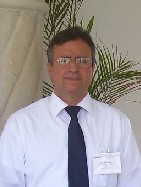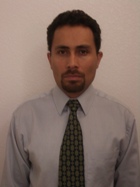|
|

PROF. DINESH BHATIA, Ph.D.
IEEE CIRCUITS AND SYSTEMS SOCIETY'S DISTINGUISHED LECTURER
Erik Jonsson School of Engineering and Computer Science
Embedded and Adaptive Computing Group Head
University of Texas at Dallas (USA)
|

|
Dinesh Bhatia is on the faculty of electrical engineering department at The University of Texas at Dallas. He directs research activities within the Embedded and Adaptive Computing group and is also a member of Center for Integrated Circuits and Systems at the University of Texas at Dallas. He received a Bachelor's in Electrical Engineering from Regional Engineering College, Suratkal, India, and a MS and a Ph.D. in Computer Science from the University of Texas at Dallas. His research interests include all aspects of reconfigurable and adaptive computing, architecture and CAD for field programmable gate arrays (FPGAs), physical design automation of VLSI Systems, biomedical electronics and systems, medical devices, natural energy scavenging and, applications of wireless sensor networks. His recent work on wireless sensor networks operating on scavenged energy is gaining importance in health care applications involving tele-medicine and remote health monitoring as well as in problems related to monitoring and alleviation of wood logging in forests. He has extensive experience in building large scale embedded and reconfigurable systems. Some of these activities include principal designer and investigator for RACE and NEBULA systems for Wright Laboratories of USAF, principal investigator for DARPA funded REACT program, Co-PI on AFRL funded SPARCs program and several more. He has published extensively in leading journals and conferences and continues to serve on program committees of several conferences. He is a senior member of IEEE, Computer Society, Circuits and Systems Society, Eta Kappa Nu, and recently served on the editorial board of IEEE Transactions on COMPUTERs. He is IEEE Circuits and Systems society’s distinguished lecturer for 2007. |
| |
PROF. MARIUS STRUM
Professor Associado Departamento de Sistemas Eletrônicos
Escola Politécnica da Universidade de São Paulo (Brasil)
|

|
O Prof. Marius Strum completou o curso de Engenharia Eletrônica na Escola Politécnica da USP em 1971. No mesmo ano ele completou o curso de licenciatura em Matemática no Instituto de Matemática e Estatística da USP. A partir de 1974 o Prof. Strum vem trabalhando no Laboratório de Microeletrônica da EPUSP (LME) onde obteve os graus de mestre, doutor e livre docente 1977, 1983 e 1990 respectivamente, sendo atualmente professor associado do Departamento de Engenharia Eletrônica da Universidade de São Paulo. No período de 1974 a 1985 ele desenvolveu suas atividades de pesquisa nas áreas de dispositivos semicondutores e tecnologia de fabricação MOS tendo, entre outros projetos, desenvolvido um dispositivos MOS canal N tipo depleção de dupla porta para utilização em circuitos analógicos e um dispositivo MOS de porta flutuante para utilização em memórias semicondutoras não voláteis EEPROM. Em 1986 e 1987 ele realizou um estágio de pós-doutoramento no Centro Interuniversitário de Microeletrônica IMEC em Leuven-Bélgica onde projetou vários circuitos integrados digitais utilizando as técnica de geração de módulos parametrizáveis e de compilação de silício. A partir de 1988, o Prof. Strum formou um grupo de pesquisa no LME-EPUSP que vem atuando no projeto de circuitos integrados digitais de aplicação específica (ASICs) e desenvolvimento de ferramentas de CAD aplicadas à síntese automática de ASICs e, mais recentemente de sistemas digitais integrados (conhecidos pela sigla SOC, do inglês "system-on-chip"). Sob sua responsabilidade foram desenvolvidos projetos conjuntos com o Laboratório de Comunicações e Sinais da USP, com as Universidades Federais da Paraíba e de Pernambuco no Brasil e com os laboratórios IMEC na Bélgica e TIMA e LIRM na França. O Prof. Strum publicou capítulos em 2 livros sobre metodologias para o projeto de circuitos e sistemas digitais além de ser também autor ou co-autor de mais de 50 artigos científicos publicados em anais de eventos internacionais e dos principais congressos científicos brasileiros. O Prof. Strum foi responsável pela ênfase Microeletrônica do curso de Engenharia Eletrônica da Escola Politécnica da Universidade de São Paulo de 1991 a 2001.
|
| |
PROF. FERNANDO GUARÍN, Ph.D.
Semiconductor Research and development Center
IBM Microelectronics
(USA)
|

|
Dr. Guarin is a Senior Engineer/Scientist at the IBM Microelectronics Semiconductor Research Development Center SRDC in East Fishkill N.Y. He received his BSEE from the “Pontificia Universidad Javeriana”, in Bogotá, Colombia, the M.S.E.E. degree from the University of Arizona, and the Ph.D. in Electrical Engineering form ColumbiaUniversity. His doctoral research studied the Molecular Beam Epitaxial growth of Silicon based alloys for device applications. He has been actively working in microelectronic reliability for over 25 years.
From 1980 until 1988 he was a member of the Military and Aerospace Operations division of National Semiconductor Corporation where he held positions both in engineering and management.
In 1988 he joined the IBM microelectronics division where he has worked in the reliability physics and modeling of Advanced Silicon Bipolar, CMOS and Silicon Germanium BiCMOS technologies. He has been the team leader for the qualification of several of IBM’s deep submicron CMOS and SiGe technologies. He has also served as team leader for the reliability qualification of products across several fabrication lines including Burlington, Vt., Essonnes, France and the new 300 mm line in East Fishkill, NY. He holds 8 patents, has published more than 50 papers and given four tutorials at the IEEE’s International Reliability Physics Symposium. Dr. Guarin is a senior member of the Institute of Electrical and Electronics Engineers IEEE, is the Chair for the Electron Devices Society in the IEEE’s MHV Chapter and is the president of the Society of Hispanic Professional Engineers SHPE for the Mid Hudson valley Region.
|
FERNANDO ROA, Ph.D.
Assembly Test and Technology Development
INTEL Corporation (USA)
|

|
Mr. Roa is a Sr Platform Integrator at the Assembly and Test Technology Development Group, part of Intel Corporation’s Technology Development . He received his bachelor of science in Chemical Engineering from Universidad Nacional de Colombia, his M.S. and PhD from Colorado School of Mines in Chemical and Materials science/engineering. His graduate studies were focused in very thin film metal films on composite substrates for gas separation, nanotechnology and self arranged assemblies.
He was a Research & Development engineer in the mid 90’s for Minipak SA, a packaging development company based in Colombia. While there he developed water based inks and adhesives, more than 10 specialty packages for a variety of commercial applications, helped implement ISO9001 and participated in business development for the aluminum sputtering and new polymers blown films.
He joined Intel in 2003 and since has led the back end development for three server platforms: Xeon Duo Core, Itanium I and II. He has been also a key player in the development of multiple other platforms, including Pentium IV, Centrino, Duo Core, USFF, FPGA, etc. His areas of expertise are semiconductor packaging, materials processing development, project management and technology development and commercialization.
He holds two patents and numerous internal trade secrets. He is a member of the American Chemical Society, the Electrochemical society, IEEE chapter Arizona, the institute of Chemical Engineering and other associations.
|
|
|